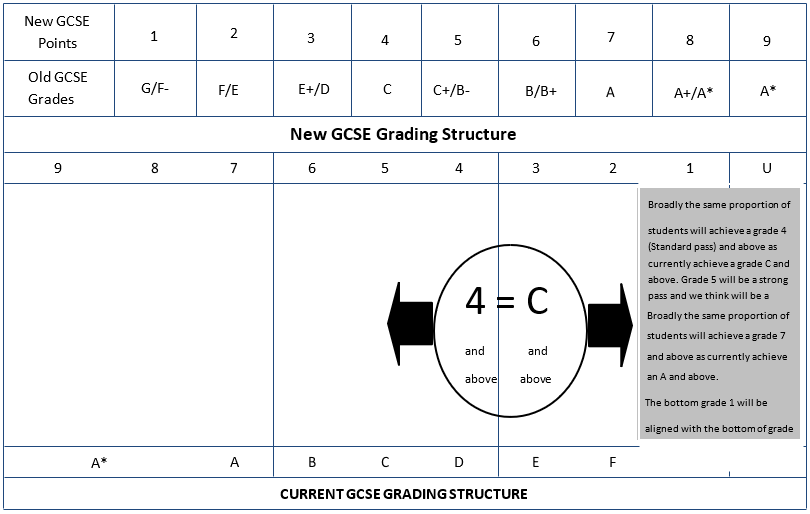GCSE Year 11 Book Now

The main GCSE exams happen at the end of year 11. This is crucial year of study as a student needs to remember all the learnings from Year 10 onwards to achieve success in GCSEs. Year 11 expects a student to be well versed with the subjects they have chosen for GCSEs. The schoolteachers keep on assessing the students during the year from their class test scores. These scores or grades are handy for the teacher to predict the grades for the student. These predicted grades are useful to understand a student’s progress and also to apply for sixth form stage at different school.
GCSE GRADING SYSTEM
Current Year 11 students will study GCSE’s in all subjects, mandatory and chosen one. GCSE’s will be graded using the numerical 1 to 9 system. The diagram below shows the appropriate comparison between the current GCSE grading system and the old ‘legacy’ system.

Exam Boards:
There are five exam boards. All your courses will be studied and assessed through one of these. They are:
OCR (www.ocr.org.uk)
AQA (www.aqa.org.uk)
EDEXCEL (www.edexcel.org.uk)
WJEC (www.wjec.co.uk)
EDUQAS (https://eduqas.co.uk/ )
At Champs Learning we offer tuition in 5 subjects:
1. Maths
2. English
3. Physics
4. Chemistry
5. Biology
Session Plan:
We understand that we have one hour per
subject per week as compared to more than 5
hours per subject at a school. Thus, the
curriculum is well structured to accommodate
all the important topics from each subject.
Curriculum for each subject is spread over 42
weeks. So for every subject we have 42
teaching sessions.
For GCSE year 11, we have 10 weeks of exam
paper practice session after the completion of
the whole curriculum. These sessions are
specifically designed to prepare students for
their real exams, with exam like question,
exam techniques etc.
Books:
For year 11, we have designed 6 books for each subject. These books complete the curriculum of GCSE. After Book 6 we have revisors for each subject and we start practicing past papers and exam related questions. We also have books on most expected questions from GCSE point of view
Our books are concept and exercise books. Only Champs Learning have created these books as per the topic for each subject. It becomes very helpful for a student to revise a particular topic.
Assessment:
After every concept or book, we conduct an
assessment. This normally has a cycle of 4
weeks. This gives a fair idea to a student and
teacher about the depth of understanding.
Accordingly, teacher adapts his teaching
sessions. We do also conduct end of the year
assessment and conduct a detailed feedback
session on these exams.
Each student is guided with marking scheme and
exam patterns with real practice. Each doubts
of every student is paid attention.
Class size: All the classes for GCSE and Key stage 3 at Champs Learning have small groups of students. This helps teachers to attend each student individually and engage for every subject. Students in small groups enjoy the advantage of personal attention and also the benefits of common queries or doubts.
Teachers:
All the teachers at Champs Learning for GCSE
are PGCE qualified and have secondary school
teaching experience. They are subject matter
experts and teach their subject individually.
All of them follow Champs Learning books and
the boards for which student preparing for.
Every teacher carry a very high success record
for their students.
Success:
All our students have been achieving high
grades from 7 onwards consistently. We are
proud of them. Each student gets personal
attention for his academic progress and
mentored for high success in the final exams.
Results of 2018-2019 and 2020 have witnessed
consistency in the success stories of our
students. Most of them enjoyed the grade 9
with very few at 7 and 8.
- Linear Equations
- Iterative Methods
- Simultaneous Equations
- Functions
- Rounding/ Estimating Numbers
- Bounds, Truncation
- Standard Form
- Calculations with Standard Form
- Direct Proportion
- Inverse Proportion
- Joint and combined Variation
- "Speed, Density and Pressure"
- Perimeter and Area - Circles
- Surface Area
- Volume
- Volume of Frustums, Ratios of Volume, Rates of Flow, Volume and Surface area of Compound shapes
- Quadratic Graphs
- Graph of complex functions (Graph cubic functions of the form, Circle Graph )
- Graphs of Complex functions(K raised to x )
- Harder Graphs (Sine Waves and Cos Buckets)
- "Circle Geometry"
- Vectors
- Trignometry
- 3D Pythagoras
At a glance
GCSE English Literature, and GSCE English Language (along with all other subjects) have been redesigned to become more demanding, bringing the UK’s 16 year old school-leavers up to par with international standards.
English Language GCSE (9-1)
Firstly, there are no set texts for
the new English Language syllabus;
pupils are expected to read a “wide
range of texts” from the 19th, 20th
and 21st century (a timely reminder to
ensure that your child is reading for
pleasure at home, from the earliest
age possible!)
The reading assessment will comprise
50% of the new exam, and will be based
on unseen texts from the past three
centuries, both fiction and
non-fiction. Pupils will be expected
to evaluate the writer’s choice of
vocabulary, form and structural
features.
The writing assessment makes up the
second 50%, with pupils expected to
write clear and coherent texts. A
weighty 20% of the marks for this exam
are awarded for range of vocabulary
and sentence structures, spelling and
punctuation (an extension of the
previous SPaG marks – spelling,
punctuation and grammar).
There will continue to be a speaking
and listening examination, however the
results for this will be reported
separately, and will not directly
count towards GCSE marks.
English Literature GCSE (9-1)
The new English Literature syllabus focuses on ‘classic literature’ and ‘substantial whole texts in detail’, taken from the following categories:
- Shakespeare
- 19th century novel
- Selection of poetry since 1789, including Romantic poetry
- Fiction or drama from the British Isles from 1914 onwards
Students will be examined in two key components:
Reading
Literal and inferential comprehension:
Pupils will be expected to read ‘beyond’ the text, and spot differences between what is stated, and what is potentially meant. They will also be required to understand what is perhaps implied by a word in the context that it is used.
Critical reading:
Again, pupils need to look beyond what is written to pull deeper meaning from texts — perhaps by understanding the writer’s social/historical context to inform evaluation. Pupils will also need to support / oppose a point of view, or make an informed personal response by referring to evidence in the given text.
Evaluation of a writer’s choice of vocabulary:
Pupils will need to use linguistic and literary terminology to evaluate grammatical and structural features (such as, but not restricted to, phrase, metaphor, meter, irony and persona, synecdoche and pathetic fallacy)
Comparing texts:
Comparing both seen and unseen texts for theme, characterisation, context, style and literary quality.
Writing
Producing clear and coherent text:
Students will be expected to tailor
their writing effectively to suit
different purposes or audiences. They
may be required to: Describe, narrate,
explain, instruct, give and respond to
information, and argue
Beyond an imaginative and creative use
of language, and the appropriate
selection of vocab, grammar, form and
structure, pupils also need to be
mindful to maintain coherence and
consistency throughout their response.
Writing for impact:
Pupils will be expected to select,
organise and emphasise key facts and
ideas. Where appropriate, they should
also cite their sources effectively in
order to support their views.
Pupils should again use imaginative,
creative and persuasive language (such
as rhetorical questions, antithesis
and parenthesis) in order to create an
emotional impact.
20-25% of the marks in the final exam
will include making comparison with
unseen texts, again raising the
importance for pupils to be in reading
and analysing texts (is your child
reading for pleasure yet?!)
A slightly less weighty 5% of marks
will be awarded for vocabulary,
sentence structures, spelling and
punctuation.
Selection of Texts
While the exam boards, on the face of it, are providing a large selection of texts which the pupils may study, the reality of the situation is that schools make this selection for the pupils. We’ve highlighted the most popular choices in the tables below.
Shakespeare
Schools will select one play from the following for students to study
| Play title | Edexcel | AQA | OCR |
|---|---|---|---|
| Macbeth | Y | Y | Y |
| Romeo and Juliet | Y | Y | Y |
| Much Ado About Nothing | Y | Y | Y |
| Twelfth Night | Y | ||
| The Merchant of Venice | Y | Y | Y |
| Julius Caeser | Y | ||
| The Tempest | Y | Y |
The 19th Century Novel
Schools will select one novel from the following for students to study
| Play title | Edexcel | AQA | OCR |
|---|---|---|---|
| Dr Jekyll and Mr Hyde – R L Stevenson | Y | Y | Y |
| Pride and Prejudice – Jane Austen | Y | Y | Y |
| Jane Eyre – Charlotte Brontë | Y | Y | Y |
| Great Expectations – Charles Dickens | Y | Y | Y |
| A Christmas Carol – Charles Dickens | Y | Y | |
| Silas Marner – George Eliot | Y | ||
| Frankenstein – Mary Shelley | Y | Y | |
| The War of the Worlds – H G Wells | Y | ||
| The Sign of Four – Sir Arthur Conan Doyle | Y |
Modern Texts
Schools will select one text from the following for students to study
| Play title | Edexcel | AQA | OCR |
|---|---|---|---|
| Animal Farm — George Orwell | Y | Y | Y |
| An Inspector Calls — J B Priestley | Y | Y | Y |
| Lord of the Flies — William Golding | Y | Y | |
| Hobson’s Choice — Harold Brighouse | Y | ||
| Blood Brothers — Willy Russell | Y | Y | |
| Journey’s End — R C Sherriff | Y | ||
| Anita and Me — Meera Syal | Y | Y | Y |
| The Woman in Black — Susan Hill | Y | ||
| The History Boys — Alan Bennett | Y | ||
| DNA — Dennis Kelly | Y | Y | |
| The Curious Incident of the Dog in the Night-Time (play script) — Simon Stephens | Y | ||
| A Taste of Honey — Shelagh Delaney | Y | ||
| Telling Tales — AQA Anthology | Y | ||
| Never Let me Go — Kazuo Ishiguro | Y | Y | |
| Pigeon English — Stephen Kelman | Y | ||
| My Mother Said I Never Should — Charlotte Keatley | Y |
-
Energy
-
Electricity
-
Particle model of matter
-
Atomic structure
-
Forces
-
Waves
-
Magnetism and electromagnetism
-
Space physics
-
Reproduction In Humans
-
Genetics & Inheritance
-
GCSE Biology Evolution
-
Living Organisms
-
Nutrition, Digestion And Excretion
-
Atomic Structure And The Periodic Table
-
Chemical Changes
-
Chemistry Of The Atmosphere
-
Chemical Analysis
-
Bonding, Structure And The Properties Of Matter
Select Your Branch
Course Features
Maths
- Sessions per week : One
- Total no of sessions : 42
- Total no of class tests : 8
- Students per class : 5
English Language
(For Literature courses, Please click Here)- Sessions per week : One
- Total no of sessions : 42
- Total no of class tests : 8
- Students per class : 5
Physics
- Sessions per week : One
- Total no of sessions : 42
- Total no of class tests : 8
- Students per class : 5
Chemistry
- Sessions per week : One
- Total no of sessions : 42
- Total no of class tests : 8
- Students per class : 5
Biology
- Sessions per week : One
- Total no of sessions : 42
- Total no of class tests : 8
- Students per class : 5

